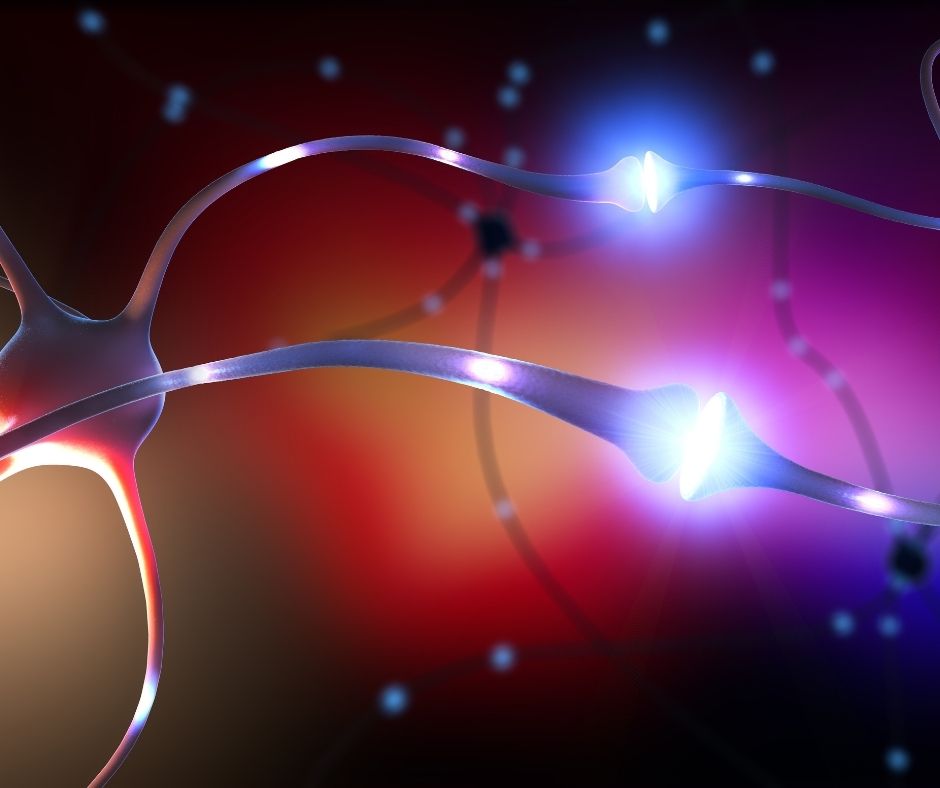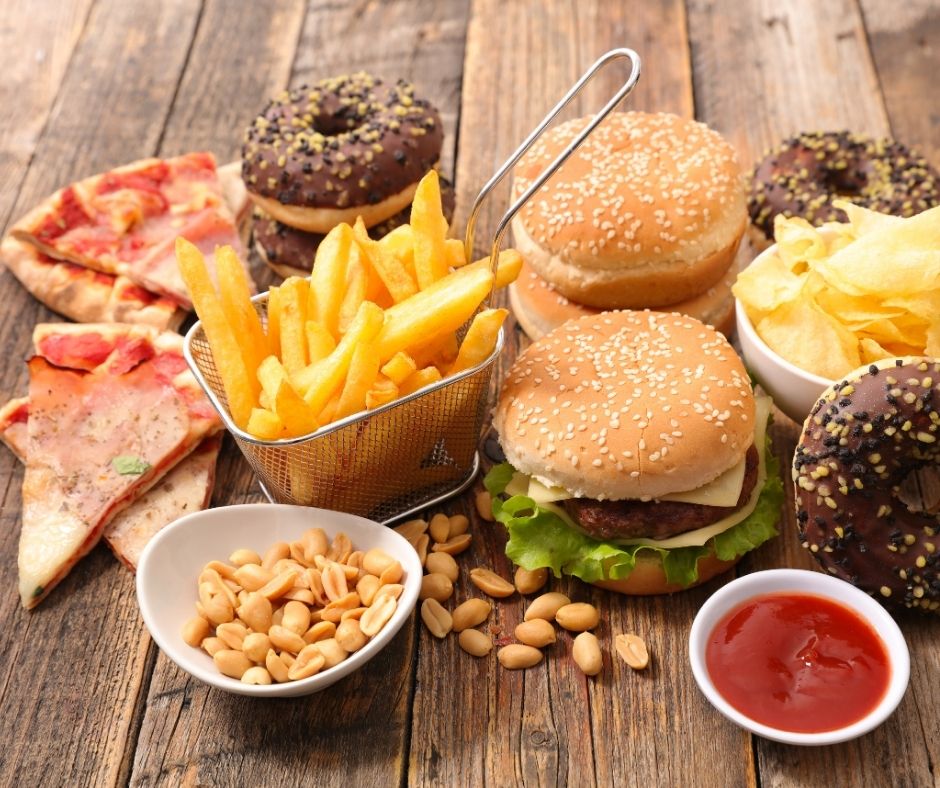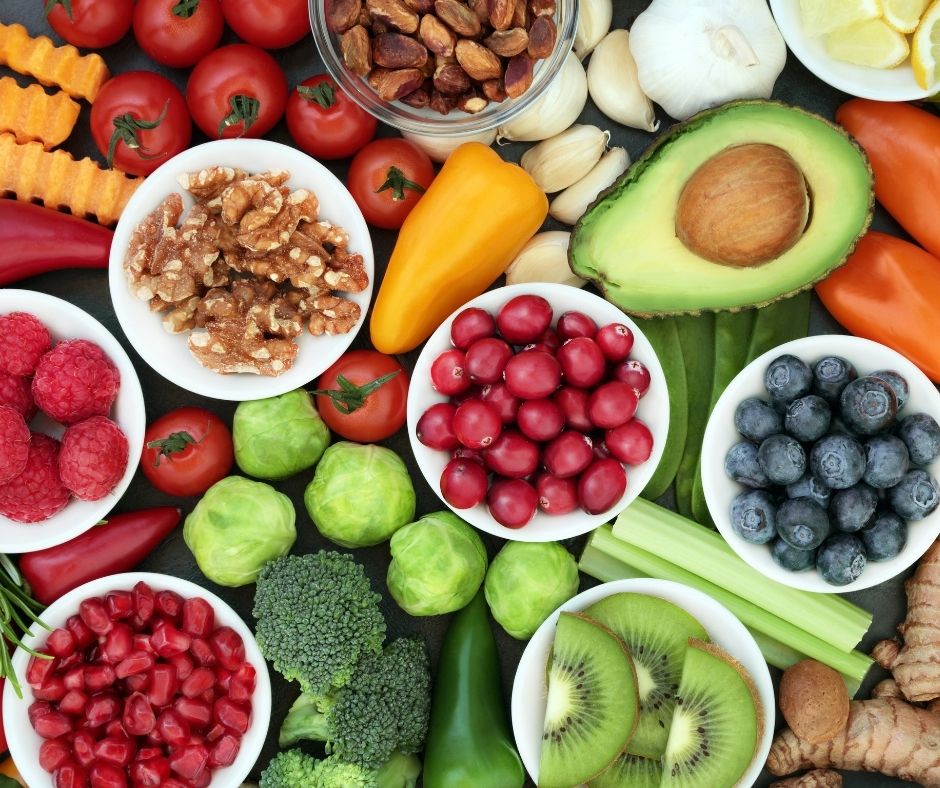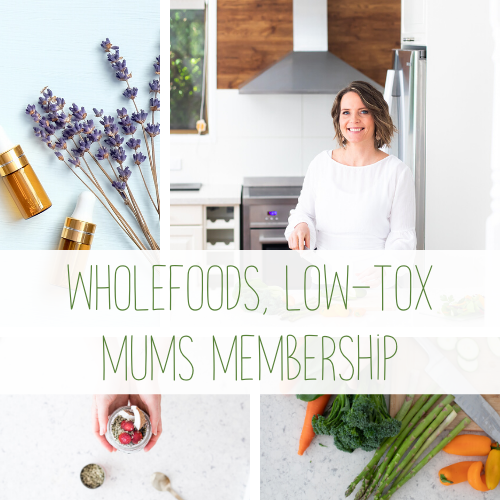Food and mood are connected. Ever wondered why when you get nervous, you get butterflies in your stomach?
Or why certain foods give you, a feel good kick?
The sensations of butterflies or the endorphin kick, shows that the brain and gut are talking. Referred to as the gut brain connection. It’s a two way link between the central nervous system and the enteric nervous system. The communication is with the vagus nerve, neurotransmitters, the immune system and the microbes in your gut. Food affects your mood in a positive or negative way.
Let’s look at the communication pathways and discuss how certain foods can affect your mood.
Vagus Nerve:
What is the vagus nerve? Extending from the brainstem through the neck and down towards the abdomen, the vagus nerve is the 10th cranial nerve. It sends signals in both directions. From the brain to the gut and from the gut to the brain.
Think of it like a super highway sending signals between your brain and gut and back again.

Neurotransmitters:
Your gut and brain are also connected through chemicals called neurotransmitters. Neurotransmitters produced in the brain control feelings and emotions.
The 3 main ones are: dopamine, serotonin and GABA.
Dopamine has to do with reward and positive effect. Psychological effects of low dopamine are depression, ADHD & social anxiety disorder. Whereas, high dopamine is schizophrenia or mania.
Serotonin contributes to happiness and also controls the body clock. Psychological Effects when low are anxiety, depression and mood impulse disorders. High serotonin displays as Agitation and restlessness.
Gamma-Aminobutyric acid (GABA) (inhibitory) has to do with relaxation, sleep and focus. Psychological Effects of low GABA are depression, mania and ADHD.
Many of these neurotransmitters are produced in the gut. So if your gut isn’t healthy then it can’t produce the neurotransmitters to make you happy either.
The gut microbes:
Essential for your gut, body and brain health, short-chain fatty acids are produced by beneficial bacteria in your gut. These short chain fatty acids, butyrate, propionate and acetate have varying functions in the body.
Acetate, controls appetite and regulates pH of the gut. It also nourishes butyrate-producing bacteria and protects against pathogens.
Butyrate, is the energy source for colon cells and helps prevent leaky gut. It combats inflammation, has anti-cancer properties and protects the brain.
Propionate, regulates appetite, combats inflammation and helps protect against cancer.
With regards to mood, butyrate is important, as it works via the gut-brain connection. High fibre diets help support the butyrate producing bacteria in your gut. High fibre can help defend against diseases like Alzheimer’s and Parkinson’s. It also helps with mental health disorders and autism spectrum disorders (ASD).
How does food affect your mood?
Wholefood nutrition is essential to support growth and brain development in children. Studies have found a relationship between food and a child’s mood. Do you find that food affects your child’s behaviour?
By being conscious of what your child eats, you may be able to tell the trigger foods for your child. Some foods have a positive effect by supporting their brain health and thus improve mood, memory and concentration. Some foods have a noticeable negative impact on a child who may be irritable, hyperactive or aggressive. There may also be a swing in moods from high to low, low motivation and a bad attitude.
When some children eat, certain foods like milk, chocolate, soy, wheat, eggs, beans, corn, tomatoes, grapes, oranges, they may exhibit hyperactive and impulsive behaviours (ADHD). An example of this could be after attending a friends birthday party and is experiencing the ‘sugar’ high, often followed by grumpiness and fatigue. This is because when we consume too much sugar, it leads to a high and then low of the blood sugar levels, often feeling worse than before you ate the food.

Foods to Avoid:
When focusing on improving mood or maintaining a healthy mood, its best to avoid certain foods.
Avoid the Sugar and Processed Foods
Sugar, in particular, is considered a major culprit of mood ups and downs. Sugar, feeds “bad” bacteria in the GI tract. High sugar foods can cause spikes in blood sugar which usually makes us feel worse, 20-60 minutes after the intake. Often becoming irritable, tired and losing concentration. Additives found in processed and packaged foods may cause disruptive behaviour in children. The colours and preservatives in foods, has been linked to impulsivity and hyperactivity in children.
Avoid things like lollies, chocolate, cakes, processed foods in packets, soft drinks and artificial sweeteners too.
Foods to Include for your Mood:
There are lots of ways to help production of your neurotransmitters as well as to keep your good bacteria happy and keep the gut brain connection functioning. One of the easiest ways is to increase the production by eating more fibre. The western diet is traditionally low in plant based foods yet this is exactly what your gut needs. By ensuring that you add fibre to each meal, you can nourish your gut bacteria. This helps them grow which produces mores short chain fatty acids and provides benefits for your gut as well as your body as a whole.
Regular snacking on healthy nutritious foods helps to avoid energy dips and provides the nutrients required to support the gut brain connection. Cravings are also less likely to occur if the blood sugar levels are stable with good wholesome snacks throughout the day.
Some easy and healthy snack ideas:
Homemade Yogurt and berries
Fermented Vegetables
Bliss balls with flaxseeds
Here’s a list of foods that help the neurotransmitters, good bacteria and brain health:
Serotonin, the happiness neurotransmitter. Bananas, Walnuts, Pineapples
Tryptophan supports serotonin production. Turkey, eggs, soybeans, pumpkin seeds, white beans, sesame seeds, mung beans, split peas, kidney beans
Tyrosine supports dopamine. Turkey, eggs, soybeans
GABA, created in the gut by Bifidobacterium and Lactobacillus and in foods such as germinated chia seeds, fermented foods like kimchi, sourdough bread, yoghurt and fermented soybeans.
Prebiotics to help feed the good bacteria: Asparagus, Leek, Onions, garlic, dandelion root, apple, Jerusalem artichoke, Jicama, bananas, konjac root, flaxseed, radishes, seaweed, hempseeds.
Fermented Foods to keep the gut happy: Yoghurt, Kimchi, Sauerkraut, Kefir, Kombucha, Fermented vegetables, Beet Kvass, Tempeh.
Omega 3 containing foods for brain health: Fish and other seafood (especially cold-water fatty fish, such as salmon, mackerel, tuna, herring, and sardines). Nuts and seeds (such as flaxseed, chia seeds,
and walnuts)
Magnesium: This essential mineral helps with nerve and muscle function, as well as vital for the food-mood connection. Dark chocolate, cacao nibs, almonds and cashews, spinach and other dark
leafy greens, bananas and beans.
Supporting the gut brain connection and ensuring good gut health is important for mood. Foods can affect mood in a positive or negative way and ensuring a diet rich in wholefoods and lots of variety can help keep you and your families moods happy.
Need more tips on how to keep your gut bacteria happy, then join the Wholefoods, Low Tox Mums Membership
Disclaimer:
All content and media on The Gut Healing Community Website is created and published online for informational purposes only. It is not intended to be a substitute for professional medical advice and should not be relied on as health or personal advice.
Always seek the guidance of your doctor or other qualified health professional with any questions you may have regarding your health or a medical condition. Never disregard the advice of a medical professional, or delay in seeking it because of something you have read on this Website.




